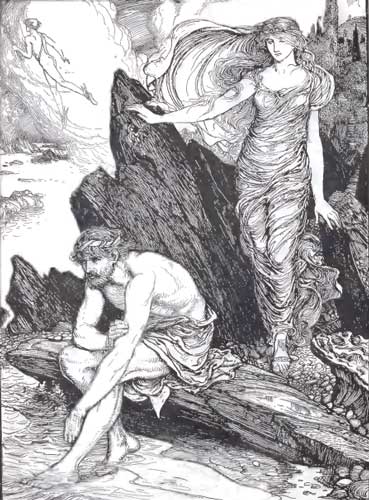The Temptation of the Hero (or You Better Do What She Says!)
In many cases, heroes in the epic are tempted. Most often it seems that temptation is presented as a sexual offering and the seductresses are most often goddesses or mythical creatures. However, it is unclear whether it is better to pass or fail these tests because not giving in to a goddess' advances almost always seems to end badly.
Particularly in the Odyssey, we meet a bunch of seductresses. They appear in very different shapes: a nymph, an enchantress, and sea monsters such as the Sirens. First, he gives in to the nymph Calypso and then he becomes the lover of the enchantress Circe. He cannot resist the temptation. Admittedly, he has his reasons for doing so (staying alive), yet, he does not resist the women’s temptations and doesn’t remain faithful to his wife Penelope. But it seems to be the wiser decision to make because he gains a lot of advantages out of being their lover. Both help him to go on with his journey and give him advice. The only time he does resist, he is tied to a ship's mast and this is probably for the better. He only does not jump into the water when he hear the song of the Sirens because he is prevented from doing so. Therefore, Odysseus proves that he can resist but that most often it is the wiser decision to give in.
In contrast to Odysseus, Gilgamesh is able to withstand the sexual advances of the goddess that is tempting him: Ishtar. Instead of giving in to her offers, he humiliates her. However, his arrogant rejection of her wish as well as the fact that he ridicules her, have terrible consequences for him. He is punished with the loss of Enkidu. Ishtar takes revenge on him. Yet, it would not have paid off for Gilgamesh to become Ishtar’s lover since she is very fickle and her previous lovers all ended up miserable. So either way, it seems to be unfortunate if you have to deal with Ishtar for men always end up miserable after dealing with her.
Thus, in comparison it seems to be the wiser decision to give in to temptation, i.e. when a goddess offers you to be her lover you better say yes or you are going to regret this because her wrath will destroy you. Giving in to a temptation is not necessarily a weakness of the hero but can also show his strength: Odysseus for instance does not like being Calypsos lover but he endures that because it is what he has to do. And he benefits from that in the end because she helps him to go home.
 |
| Odysseus and Calypso |


0 comments: